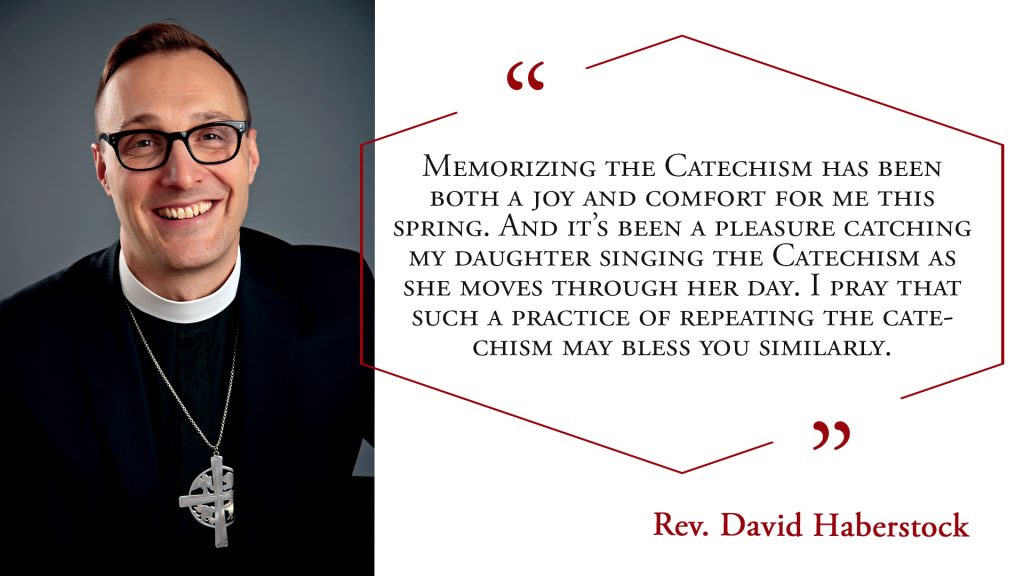Spiritual Warfare

by David Haberstock
A while ago, I was reading the Introduction to Luther’s Large Catechism and found much wisdom and encouragement there. The recent lockdowns have been a time of great anxiety and frustration. Stuck in our houses, cut off from family, friends, congregation, and regular social networks, we’ve become short-fused, owl-y, and growly with our loved ones. On some level, the distressing unrest in broader society may be a by-product of this seclusion and disruption—a way to release pressure.
But think about this: as much as you’ve been on edge with your loved ones, how much does this impact your general mood and attitude towards the Church (your congregation, your pastor, fellow pastors, and so forth), the government, and life right now? And ultimately, how does that affect how you have treated your neighbours, especially your brothers and sisters in Christ?
But think about this: as much as you’ve been on edge with your loved ones, how much does this impact your general mood and attitude towards the Church (your congregation, your pastor, fellow pastors, and so forth), the government, and life right now? And ultimately, how does that affect how you have treated your neighbours, especially your brothers and sisters in Christ?
There is a lot of bad behaviour going on in each of our homes and each of our hearts. Mood regulation is a real challenge for many of us at the moment (including myself). If you’ve been struggling with this, hopefully one part of your prayers and inner dialogue has focused on repentance to the Lord for such behaviour.
This brings us back to the Catechism. There are many stresses on us, so do not forget that Satan and his minions are always at work in such challenges, seeking to push you past proper decorum, civility, and the bounds of love to harm one another. We are engaged, now more than ever, in a spiritual fight (Ephesians 6:11-12; 2 Corinthians 10:3-6).
Luther has much help to offer us in the Large Catechism. For instance, he says that a useful devotional practice for every Christian is to “read each morning, noon, and evening only a page or two in the catechism, the prayer book, the New Testament, or something else in the Bible.” He writes: “Every morning—and whenever I have time—I read and say, word for word, the Ten Commandments, the Creed, the Lord’s Prayer, the Psalms, and such. I must still read them daily. Yet I cannot master the catechism as I wish.” The reason we do this is because “the Holy Spirit is present in such reading, repetition, and meditation. He bestows ever new and more light and devoutness” (cf. Ephesians 6:17).
These next words of Luther are what have been very helpful for my mood lately:
“Besides, catechism study is a most effective help against the devil, the world, the flesh, and all evil thoughts. It helps to be occupied with God’s Word, to speak it, and meditate on it, just as the first psalm declares people blessed who meditate on God’s Law day and night (Psalm 1:2).” This is most certainly true!
Some years ago at our circuit’s summer camp, I wrote little tunes to help kids memorize the Catechism. Lately my nine-year-old and I have been working our way through the Catechism by learning those tunes (many can be found on YouTube here: shorturl.at/htGL0). To be occupied with the Word of God, to have it in your heart, and on your tongue is a great help in lifting your spirit and driving away Satan and his constant temptations to frustration, despair, or whatever unhelpful thought patterns you may wrestle with that are plaguing your mood and demeanour these days.
Or as Luther says:
“Certainly you will not release a stronger incense or other repellent against the devil than to be engaged by God’s commandments and words, and speak, sing, or think them (Colossians 3:16). For this is indeed the true ‘holy water’ and ‘holy sign’ from which the devil runs and by which he may be driven away (James 4:7).”
Again: “Now for this reason alone you ought gladly to read, speak, think, and use these things, even if you had no other profit and fruit from them than driving away the devil and evil thoughts by doing so. He can not hear or endure God’s Word.”
And again: “We not only need all this every day just as we need our daily bread, but we must also daily use it against the daily unending attacks and lurking of the devil (1 Peter 5:8).”
Memorizing the Catechism has been both a joy and comfort for me this spring. And it’s been a pleasure catching my daughter singing the Catechism as she moves through her day. I pray that such a practice of repeating the catechism may bless you similarly.
———————
Rev. David Haberstock is Regional Pastor for Lutheran Church–Canada’s Central Region.



